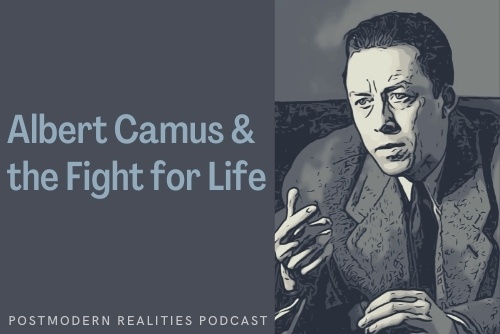“Why,” Camus asks, “should a human go on living if life has no meaning?” He concludes that life can be lived—even loved—despite the emptiness from which it arises and to which it returns. Such meaninglessness as Camus describes arises from his lack of religious faith. What he does accept are those things of which he feels sure: “This heart within me I can feel, and I judge that it exists. This world I can touch, and I likewise judge that it exists. There ends all my knowledge, and the rest is construction.”
Unable to penetrate beyond these two certainties, he asks what a human being should make of this existence. The answer makes Albert Camus compelling for everyone, Christians included: “I know that in order to keep alive, the absurd cannot be settled. It escapes suicide to the extent that it is simultaneously awareness and rejection of death.” By acknowledging that death destroys meaning while resisting its power to make him despair, Camus takes up the fight for life.
This Postmodern Realities episode is a conversation with Journal author Stephen Mitchell about 37:6 (2014) article, “The Sting of Death: Albert Camus and the Fight for Life”.
We’d also like to invite you to subscribe to the Journal. To subscribe to the Journal, please click here.
When you to subscribe to the Journal, you join the team of print subscribers whose paid subscriptions help provide the resources at equip.org that minister to people worldwide. These resources include our free online-exclusive articles, such as this review, as well as our free Postmodern Realities podcast.
Another way you can support keeping our resources free is by leaving us a tip. A tip is just a small amount, like $3 or $5, which is the cost for some of a latte, lunch out, or coffee drink. To leave a tip, click here.
Other articles and Postmodern Realities podcasts featuring this author:
Episode 189 Second-Rate Musician: Vocation and Performance in T. S. Eliot’s The Confidential Clerk
Second-Rate Musician:Vocation and Performance in T. S. Eliot’s The Confidential Clerk
Episode 135-Questing for Divine Love-Cormac McCarthy’s The Road
Questing for Divine Love-Cormac McCarthy’s The Road
Episode 111 Humanity Crucified: Hemingway and the Human Condition
Humanity Crucified: Hemingway and the Human Condition
Episode 092 Literary Apologetics: Flannery O’Connor
Episode 045: Alexander Solzhenitsyn Confronts the Grand Inquisitor
Alexander Solzhenitsyn Confronts the Grand Inquisitor
Rejoicing over Owls: Thoreau and the Gift of Being
The Sting of Death: Albert Camus and the Fight for Life
Reading My Favorite Atheists: Ivan, Raskolnikov, and Kirilov
